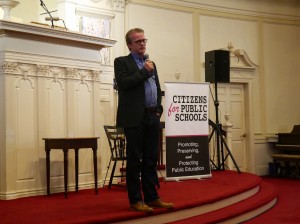By Lisa Guisbond
We all got a taste of Finnish education from Pasi Sahlberg Wednesday night, and boy did it taste good! In describing his country’s approach to school reform, the Finnish educator and author filled First Parish Church with hope and optimism by showing us “some new ideas about what is possible, not just about what is wrong.”
Pasi did not shy away from critiquing the ways U.S. education reform has gone astray. “You are testing your kids too much, it is too expensive, and it has negative consequences for students.” (According to Pasi, an expression I thought was a piece of American folk wisdom is also used in Finland: “Weighing the pig doesn’t make it fatter.” The difference is, in Finland, they take this to heart!)
Pasi described a system that spends less than the U.S. Nevertheless, it gives all schools equitable resources, has well-trained and highly respected teachers, little standardized testing, and recognizes children’s need for play and creative expression. → Read More


